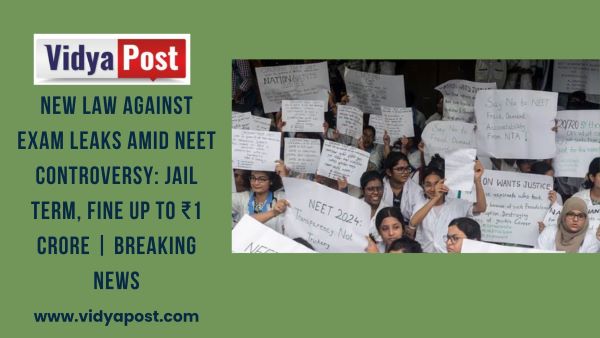New Law Against Exam Leaks Amid NEET Controversy: Jail Term, Fine Up to ₹1 Crore | Breaking News

New Law Against Exam Leaks Amid NEET Controversy: Jail Term, Fine Up to ₹1 Crore
In response to the ongoing controversies surrounding the NEET and UGC-NET exams, the Indian government has enacted a stringent new law aimed at preventing paper leaks and cheating. The Public Examinations (Prevention of Unfair Means) Act, 2024, was officially notified just days after Education Minister Dharmendra Pradhan addressed its impending implementation.
Key Provisions of the New Law
Stringent Penalties for Paper Leaks
Under the new Act, anyone found guilty of leaking exam papers or tampering with answer sheets will face severe penalties. The law mandates a minimum jail term of three years, which can extend to five years, along with fines up to ₹10 lakh. All offences under this Act are cognisable and non-bailable, ensuring that those involved face significant legal consequences. (Source)
Heavy Fines for Examination Service Providers
Examination service providers who are aware of potential offenses but fail to report them will be fined up to ₹1 crore. This provision aims to ensure that all stakeholders in the examination process are vigilant and accountable.
Accountability for Senior Officials
If it is determined that any senior official from the service provider was complicit in the offense, they will face imprisonment ranging from three to ten years and a fine of ₹1 crore. This clause underscores the government's commitment to holding higher-ups accountable for any misconduct.
Organized Crime Penalties
In cases where the examination authority or service provider is found to be involved in organized crime, the penalties are even more severe. The minimum jail term is five years, with a maximum of ten years, and the fine remains ₹1 crore.
Implementation and Transition
The notification also mentions the Bharatiya Nyaya Sanhita but clarifies that the provisions of the Indian Penal Code will continue to be in effect until the new code is implemented. The new criminal laws, including the Bharatiya Nyaya Sanhita, are set to come into effect on July 1.
Background of the NEET Controversy
Allegations and Protests
The NEET-UG 2024 exam, conducted by the National Testing Agency (NTA), saw nearly 24 lakh students appearing for undergraduate medical courses. However, the results, announced on June 4, ten days ahead of schedule, were marred by allegations of question paper leaks and the awarding of grace marks to over 1,500 students. These allegations sparked widespread protests and led to legal challenges, including cases filed in the Supreme Court, which criticized the NTA for its handling of the situation.
Impact on UGC-NET Exam
In a related development, the Education Ministry canceled the UGC-NET exam a day after it was held. Over 9 lakh candidates had appeared for this exam, which determines eligibility for Assistant Professor positions and junior research fellowships. The cancellation followed reports from the cybercrime team in the Home Ministry about questions appearing on the darknet.
Government Response
Addressing the media, Education Minister Dharmendra Pradhan acknowledged the allegations of exam leaks, describing them as isolated incidents but taking moral responsibility for them. He faced criticism from the opposition, which has been vocal about the issue and plans to raise it in Parliament.
Conclusion
The enactment of the Public Examinations (Prevention of Unfair Means) Act, 2024, marks a significant step in addressing the integrity issues plaguing national exams like NEET and UGC-NET. With stringent penalties for those involved in paper leaks and a robust framework for holding examination authorities accountable, this new law aims to restore faith in the examination process. As the new provisions come into effect, it is hoped that they will deter future misconduct and ensure fair and transparent examinations for all candidates. (Source)
Also, read: What the ban of UK family visa means for indians
Share:

2 Comments
Jordan Singer
2d2 replies
Santiago Roberts
4d